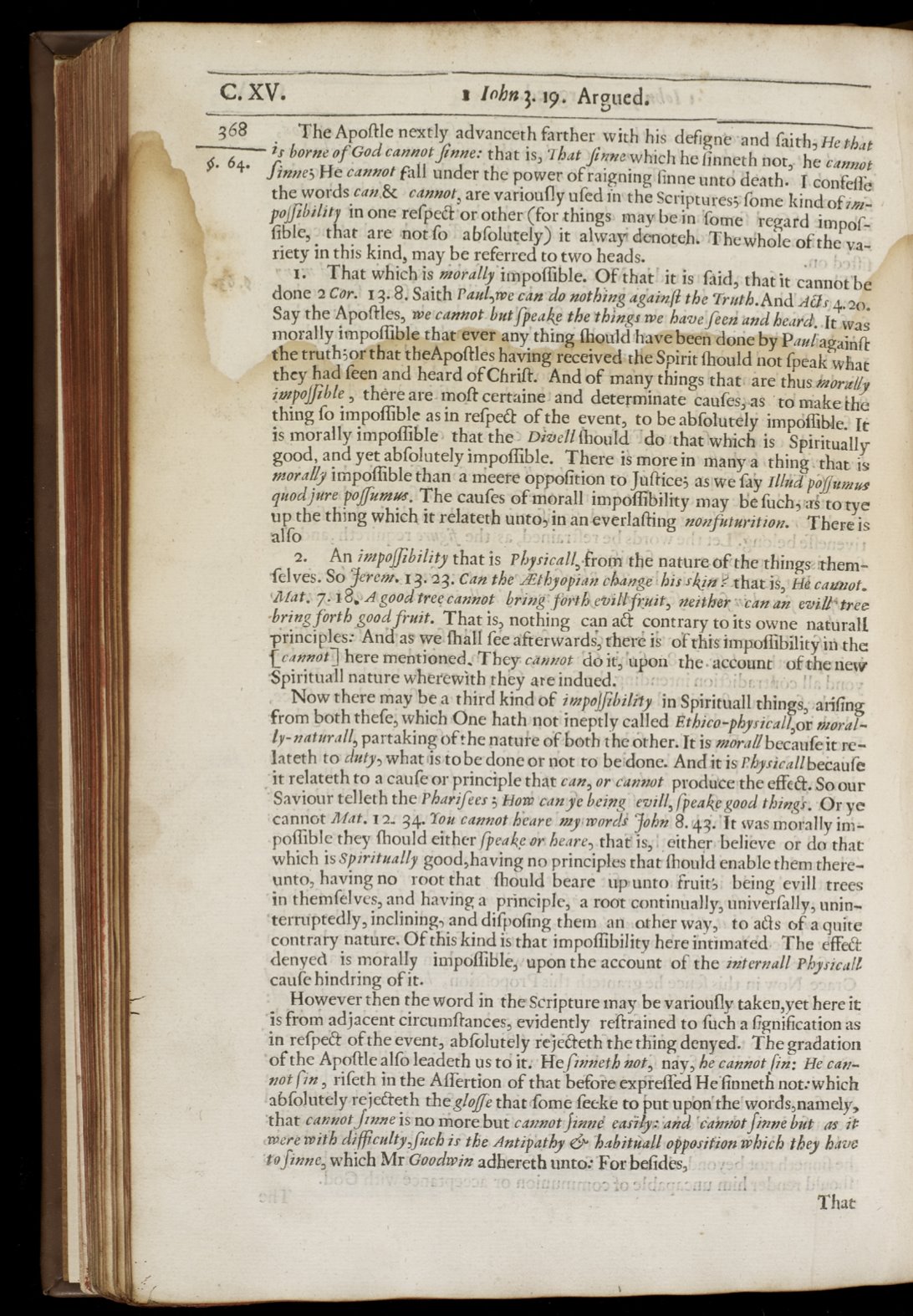

C.
XV.
i
Lohn
3.
19.
Argued.
368
The
Apo(tle
nextly advanceth farther with
his cíefigne
and
faith,
He
that
is
borne
of
God cannot
finne:
that
is,
T
hat finne which he finneth
not,
he
cannot
4' 64'
finne;
He
cannot
fall under the power
of
raigning
finne
unt
i
death.
I confeffe
the
words
can,& cannot,
are varioufly ufed in
the
scriptures;
Come
kind
of
7M
poff
bility in
one
refpe&
or other (for
things
may be
in
forne
regard
impof-
fible,
that
are
not
fo
abfolutely)
it
alway.
denoteh.
The
whole
of
the va-
riety
in
this
kind, may
be
referred to two
heads.
r. That
which
is
morally
impoflìble.
Of
that
it
is
faid,
that
it
cannotbe
done
2
Cor.
13. 8.
Saith
Paul,we
can
do
nothing againfl the
7ruth.And
As
4.20.
Say
the
Apoftles,
we
cannot butfpeake the
things
we
have
feen and
heard.
It
was
morally impoffible
that
ever
any
thing mould
have
been
done by Paul
againft
the truth
or
that
theApoftles having received
the
Spirit
íhould not
(peak
what
they had
feen
and heard
of
Chrift. And
of
many
things
that
are
thus
morally
impoffible ,
there
are moft certaine and
determinate
caufes,
as
to make the
thing
fo
impofíïble
as
in refpe&
of
the event,
to
be abfolutely
impoffible.
It
is
morally impoffible
that
the
Divell fbould do
that
which
is
Spiritually
good, and yet abfolutely impoffible.
There
is
more
in
many
a
thing
that
is
morally
impoffible
than
a
nieere
oppouition
to Janice;
as
we
fay
Illxd
poffumus
quod
jure
poffumus.
The
caufes
of
morall
impoflbility
may be fuch,
as
to tye
up
the
thing
which
it relateth unto,
in an
everlafting
nonfisturition.
There
is
all()
2.
An impoffibility
that
is
Physical!,
froth the nature
of
the
things
them-
felves.
So
jerent. 13.23.
Can
the'
?thyopian change his
shin
.'
that
is,
He
cannot.
'Mat.
7.18,
A
good tree cannot
bring forth evil!
fruit,
neither can an
evil!"
tree
bring
forth
good
fruit. That
is,
nothing
can
a&
contrary to
its
owne
naturali
principles:
And
as
we
{hall
fee
afterwards, there
is
of
this
impofhbilityin
the
cannot-
here mentioned_ 'They
cannot
do
it, upon
the account
of
thenetw
'Spirituall
nature
wherewith they are indeed.
Now
there
may
be
a
third
kind
of
impojfibiliry in
Spirituali things,
arifing
from
both
thefe,
which
One
hath
not
ineptly called
Ethico-physicall,or
onoral-
ly
natural!,
partaking
of
the nature
of
both the other. It
is
moral
/
becaufe
it
re-
lateth
to
duty,
what
as
to
be done
or not
to
be done. And
it
is
rhysicall becau(e
it
relateth to
a
caufe
or principle
that
can,
or
cannot
produce the
effe&.
So
our
Saviour
telleth the
Pharifees;
How
can
ye
being evil!,rpealtegood things.
Or
ye
cannot Mat.
12. 34.
You
cannot heare
my.
words
John
8.43. It
was
morally
im-
poflible they fhould either
fpeahe or heare,
that
is,
:
either
believe or do
that
which
is
Spiritually
good,having
no principles
that
fhoutd
enable them
there-.
unto,
having
no root that
should
beare up
unto
fruits being
evils
trees
in
themfelves, and having
a
principle,
a
root
continually, univerfally, unin-
terruptedly,
inclining, and
difpofing
them
an
other
way,
to
aéls
of
a
quite
contrary nature.
Of
this
kind
is
that
impoflìbility here
intimated
The
effe&
denyed
is
morally impoffible, upon
the
account
of
the
internal!
Physical!
caufe
hindring
of
it.
However then the word
in
the
Scripturemay be varioufly taken,yet here
it
is
from
adjacent
circumftances, evidently reftrained
to
fuch
a
fignification as
in
refpe&
of
the event, abfolutely
rejeð
the thing
denyed.
The
gradation
of
the
Apoftle alto
leadeth
us
to
it.
Hefinneth
not,
nay,
he
cannot fin:
He
can
-
not
tin,
rifeth
in
the
Aflertion
of
that
before
expreffed He finneth
not:
which
abfolutely rejeð
the
slop that
tome feeke
to
put
upon the words,namely,
that
cannot,
finne
is
no more
but
cannot
finne
easily.:
and
'cannot
finne
but
as
it
were
with
difficulty
,
fisch
is the Antipathy
6v habitual!
opposition
which they have
'to
finne,
which Mr
Goodwin
adhereth
unto:
For
betides,
That










